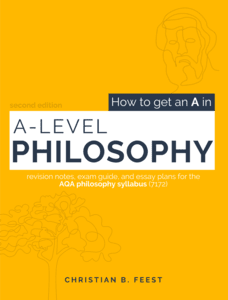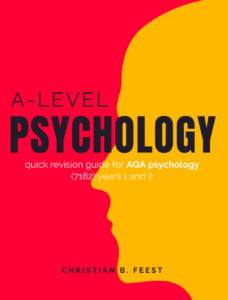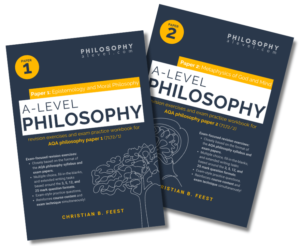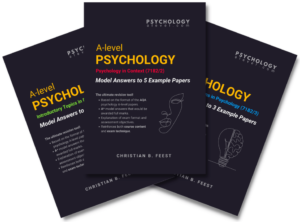How to get an A in A-level Philosophy
UK | USA | Canada | France | Germany | Italy | Netherlands | Spain | Singapore | Japan
How to get an A in A-level Philosophy is the course textbook written with the student in mind. Focused on the AQA philosophy syllabus from 2017 onwards (7172), this book covers all four modules in a simple and concise manner. Using plenty of examples, each idea is broken down into what that idea is, the arguments for that idea, and the arguments against. Later sections explain (with examples) how to communicate these ideas and arguments to achieve maximum marks in the exam.
Inside you will find:
- Explanation of syllabus topics for all four modules:
- Epistemology
- Moral philosophy
- Metaphysics of God
- Metaphysics of mind
- Bullet point summaries at the end of each module
- Exam blueprint for each question type with examples
- Example 25 mark answer plans for every major topic
- 3, 5, 12, and 25 mark practice questions
- Revision exercises including multiple choice quizzes
- Glossary of key terms
Second edition published September 2022
Pages: 333
ISBN: 9798719524658
A-level Psychology Quick Revision Guide
UK | USA | Canada | France | Germany | Italy | Netherlands | Spain | Singapore
A quick revision guide covering the entire AQA psychology course!
Written with exam preparation in mind, this quick revision guide covers the entire AQA psychology A-level syllabus (7182) in 191 colourful pages. Key ideas, theories, and studies are concisely summarised and evaluation points are clearly identified. Next, the exam format and assessment objectives are explained with examples. Finally, a broad range of exam-style questions provides hours of revision practice.
Inside you will find:
- Straightforward coverage of syllabus content for all topics across all 3 papers:
- Introductory Topics in Psychology
- Psychology in Context
- Issues and Options in Psychology
- Clearly identified AO3 evaluation points (strengths and weaknesses)
- Revision tips and techniques to achieve maximum marks in the exam
- Realistic practice questions based on the AQA exam papers
- Exam blueprint for each paper with explanations of assessment objectives and example answers
- Glossary of key terms
First edition published April 2023
Pages: 191
ISBN: 9798387512025
A-level Philosophy Workbooks
Click here to view on Amazon.co.uk
The most effective way to revise A-level philosophy!
- Closely based on the AQA philosophy syllabus and exam papers
- Multiple choice, fill-in-the-blanks, crossword puzzles, and extended writing exercises based around the 3, 5, 12, and 25 mark question formats
- Exam-style practice questions
- Reinforces course content and exam technique simultaneously!
Closely based on AQA philosophy exam papers (7172), these exam practice workbooks help students reinforce their philosophical knowledge of epistemology, moral philosophy, the metaphysics of God and mind while simultaneously building writing skills for exam success. Helpful exam tips are mixed in among the various activities – which include crossword puzzles, fill-in-the-blanks, multiple choice, extended writing, and more – to provide a clear structure for answering the 3, 5, 12, and 25 mark questions that come up in the exam. Once students are confident in answering these different question formats, a comprehensive lists of exam-style questions provide hours of revision practice.
A-level Psychology Practice Papers
Click here to view on Amazon.co.uk
Revise the course content and exam technique simultaneously!
- Based on the format of the AQA Psychology A-level exam papers
- Realistic questions that could come up in the exam
- A* model answers that would be awarded full marks
- Explanation of exam format and assessment objectives
Based on the format of the AQA Psychology A-level (7182) exam papers, these booklets contain full exam papers with A* grade model answers. Each paper features a unique mix of question formats that includes extended response, multiple choice, and mathematical questions. Available marks for each question are broken down by assessment objective so students can consolidate their knowledge and understanding (AO1), application abilities (AO2), and evaluation skills (AO3).



